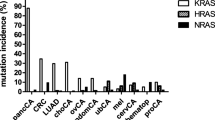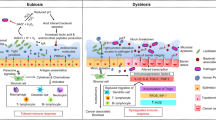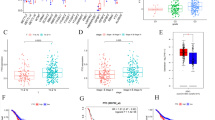Abstract
Purpose
To evaluate the prevalence of two recurrent somatic mutations (−124 C>T and −146 C>T) within the promoter of the gene encoding telomerase reverse transcriptase (TERT) as well as their relationship with TERT level, telomeres length, and outcome in patients with head and neck squamous cell carcinomas (HNSCCs).
Methods
We evaluate the prevalence of TERT promoter mutations, TERT levels, and telomere length in paired cancer tissue and adjacent mucosa (AM) in a series of HNSCCs.
Results
Cancer tissue and AM specimens from 105 patients were analyzed. Telomere length and TERT mRNA levels were estimated using real-time polymerase chain reaction. TERT promoter mutations were assessed using Sanger sequencing. Out of 105 cases, 101 were considered suitable for the analysis. TERT promoter harbored mutations in 12 tumors (11.9%), with −124 C>T and −146 C>T accounting for 83.3% and 16.7% of the alterations, respectively. No mutations were detected in AM samples. The prevalence of TERT promoter mutations was significantly higher in oral cavity SCCs (10 out of 27 tumors; 37%), and telomere length in AM was shorter in patients with tumors carrying TERT promoter mutations than in patients with unmutated TERT promoter cancers (p = 0.023). TERT levels in tumor did not significantly differ according to the mutational status of TERT promoter. No significant association was found between TERT promoter status and overall survival.
Conclusion
TERT promoter mutations are most likely a late event in tumor development, occurring in a context of critically short telomeres, mostly in patients with oral cavity SCC. TERT levels, but not TERT promoter mutational status impact clinical outcome.


Similar content being viewed by others
References
Akincilar SC, Unal B, Tergaonkar V (2016) Reactivation of telomerase in cancer. Cell Mol Life Sci CMLS 73:1659–1670. https://doi.org/10.1007/s00018-016-2146-9
Annunziata C, Pezzuto F, Greggi S et al (2018) Distinct profiles of TERT promoter mutations and telomerase expression in head and neck cancer and cervical carcinoma. Int J Cancer 143:1153–1161. https://doi.org/10.1002/ijc.31412
Boscolo-Rizzo P, Rampazzo E, Perissinotto E et al (2015) Telomere shortening in mucosa surrounding the tumor: biosensor of field cancerization and prognostic marker of mucosal failure in head and neck squamous cell carcinoma. Oral Oncol 51:500–507. https://doi.org/10.1016/j.oraloncology.2015.02.100
Boscolo-Rizzo P, Da Mosto MC, Rampazzo E et al (2016) Telomeres and telomerase in head and neck squamous cell carcinoma: from pathogenesis to clinical implications. Cancer Metastasis Rev 35:457–474. https://doi.org/10.1007/s10555-016-9633-1
Brandwein-Weber MS (2018) Textbook of head and neck pathology. Springer International Publishing, Cham
Bray F, Ferlay J, Soerjomataram I et al (2018) Global cancer statistics 2018: GLOBOCAN estimates of incidence and mortality worldwide for 36 cancers in 185 countries. CA Cancer J Clin 68:394–424. https://doi.org/10.3322/caac.21492
Chan SRWL, Blackburn EH (2004) Telomeres and telomerase. Philos Trans R Soc Lond B Biol Sci 359:109–121. https://doi.org/10.1098/rstb.2003.1370
Chang K-P, Wang C-I, Pickering CR et al (2017) Prevalence of promoter mutations in the TERT gene in oral cavity squamous cell carcinoma. Head Neck 39:1131–1137. https://doi.org/10.1002/hed.24728
Cheng KA, Kurtis B, Babayeva S et al (2015) Heterogeneity of TERT promoter mutations status in squamous cell carcinomas of different anatomical sites. Ann Diagn Pathol 19:146–148. https://doi.org/10.1016/j.anndiagpath.2015.03.005
El-Hefnawy T, Raja S, Kelly L et al (2004) Characterization of amplifiable, circulating RNA in plasma and its potential as a tool for cancer diagnostics. Clin Chem 50:564–573. https://doi.org/10.1373/clinchem.2003.028506
Gianesin K, Noguera-Julian A, Zanchetta M et al (2016) Premature aging and immune senescence in HIV-infected children. AIDS Lond Engl 30:1363–1373. https://doi.org/10.1097/QAD.0000000000001093
Giunco S, Rampazzo E, Celeghin A et al (2015) Telomere and telomerase in carcinogenesis: their role as prognostic biomarkers. Curr Pathobiol Rep 3:315–328. https://doi.org/10.1007/s40139-015-0087-x
Hanahan D, Weinberg RA (2011) Hallmarks of cancer: the next generation. Cell 144:646–674. https://doi.org/10.1016/j.cell.2011.02.013
Heidenreich B, Kumar R (2017) TERT promoter mutations in telomere biology. Mutat Res 771:15–31. https://doi.org/10.1016/j.mrrev.2016.11.002
Horn S, Figl A, Rachakonda PS et al (2013) TERT promoter mutations in familial and sporadic melanoma. Science 339:959–961. https://doi.org/10.1126/science.1230062
Huang FW, Hodis E, Xu MJ et al (2013) Highly recurrent TERT promoter mutations in human melanoma. Science 339:957–959. https://doi.org/10.1126/science.1229259
Indraccolo S, Lombardi G, Fassan M et al (2019) Genetic, Epigenetic, and immunologic profiling of MMR-deficient relapsed glioblastoma. Clin Cancer Res Off J Am Assoc Cancer Res 25:1828–1837. https://doi.org/10.1158/1078-0432.CCR-18-1892
Killela PJ, Reitman ZJ, Jiao Y et al (2013) TERT promoter mutations occur frequently in gliomas and a subset of tumors derived from cells with low rates of self-renewal. Proc Natl Acad Sci 110:6021–6026. https://doi.org/10.1073/pnas.1303607110
Leão R, Apolónio JD, Lee D et al (2018) Mechanisms of human telomerase reverse transcriptase (hTERT) regulation: clinical impacts in cancer. J Biomed Sci 25:22. https://doi.org/10.1186/s12929-018-0422-8
Leemans CR, Snijders PJF, Brakenhoff RH (2018) The molecular landscape of head and neck cancer. Nat Rev Cancer 18:269–282. https://doi.org/10.1038/nrc.2018.11
Menin C, Bojnik E, Del Bianco P et al (2016) Differences in telomere length between sporadic and familial cutaneous melanoma. Br J Dermatol 175:937–943. https://doi.org/10.1111/bjd.14652
Morris LGT, Chandramohan R, West L et al (2017) The molecular landscape of recurrent and metastatic head and neck cancers: insights from a precision oncology sequencing platform. JAMA Oncol 3:244–255. https://doi.org/10.1001/jamaoncol.2016.1790
Papagerakis S, Pannone G, Zheng L et al (2014) Oral epithelial stem cells—implications in normal development and cancer metastasis. Exp Cell Res 325:111–129. https://doi.org/10.1016/j.yexcr.2014.04.021
Qu Y, Dang S, Wu K et al (2014) TERT promoter mutations predict worse survival in laryngeal cancer patients. Int J Cancer 135:1008–1010
Rampazzo E, Bertorelle R, Serra L et al (2010) Relationship between telomere shortening, genetic instability, and site of tumour origin in colorectal cancers. Br J Cancer 102:1300–1305. https://doi.org/10.1038/sj.bjc.6605644
Rampazzo E, Del Bianco P, Bertorelle R et al (2018) The predictive and prognostic potential of plasma telomerase reverse transcriptase (TERT) RNA in rectal cancer patients. Br J Cancer 118:878–886. https://doi.org/10.1038/bjc.2017.492
Ruijter JM, Ramakers C, Hoogaars WMH et al (2009) Amplification efficiency: linking baseline and bias in the analysis of quantitative PCR data. Nucleic Acids Res 37:e45. https://doi.org/10.1093/nar/gkp045
Schwaederle M, Krishnamurthy N, Daniels GA et al (2018) Telomerase reverse transcriptase promoter alterations across cancer types as detected by next-generation sequencing: a clinical and molecular analysis of 423 patients. Cancer 124:1288–1296. https://doi.org/10.1002/cncr.31175
Spornraft M, Kirchner B, Haase B et al (2014) Optimization of extraction of circulating RNAs from plasma—enabling small RNA sequencing. PLoS ONE 9:e107259. https://doi.org/10.1371/journal.pone.0107259
Terrin L, Rampazzo E, Pucciarelli S et al (2008) Relationship between tumor and plasma levels of hTERT mRNA in patients with colorectal cancer: implications for monitoring of neoplastic disease. Clin Cancer Res Off J Am Assoc Cancer Res 14:7444–7451. https://doi.org/10.1158/1078-0432.CCR-08-0478
Vinothkumar V, Arunkumar G, Revathidevi S et al (2015) TERT promoter hot spot mutations are frequent in Indian cervical and oral squamous cell carcinomas. Tumour Biol J Int Soc Oncodevelopmental Biol Med. https://doi.org/10.1007/s13277-015-4694-2
Funding
This research did not receive any specific grant from funding agencies in the public, commercial, or not-for-profit sectors.
Author information
Authors and Affiliations
Corresponding author
Ethics declarations
Conflict of interest
The authors declare that they have no competing interests.
Ethical approval
The local institutional review board approved the study protocol (“Comitato Etico Sperimentazione Clinica per le Province di Treviso e Belluno”, Italy; ethic vote: 346/AULSS9) and all patients gave their informed consent.
Additional information
Publisher's Note
Springer Nature remains neutral with regard to jurisdictional claims in published maps and institutional affiliations.
Electronic supplementary material
Below is the link to the electronic supplementary material.
Rights and permissions
About this article
Cite this article
Boscolo-Rizzo, P., Giunco, S., Rampazzo, E. et al. TERT promoter hotspot mutations and their relationship with TERT levels and telomere erosion in patients with head and neck squamous cell carcinoma. J Cancer Res Clin Oncol 146, 381–389 (2020). https://doi.org/10.1007/s00432-020-03130-z
Received:
Accepted:
Published:
Issue Date:
DOI: https://doi.org/10.1007/s00432-020-03130-z




